If you are looking at this because you are thinking of getting married - congratulations! We would be delighted to provide the venue.
Christians see marriage as a gift from God. The Bible compares married love with the love Jesus has for his followers - unconditional! 1 Corinthians 13 describes that love (see under the first sub-menu item). Try reading that chapter and replacing the word 'love' with your own or your future spouse's name. It's a high ideal!
Via the sub-menu you can find some information about arranging a marriage service in the Parish of All Saints Congleton. This Church of England website offers lots of resources to help you prepare for your church wedding (opens in new window).

To find out which parish you live in, visit A Church Near You and enter your postcode in the search field.
Christian Marriage
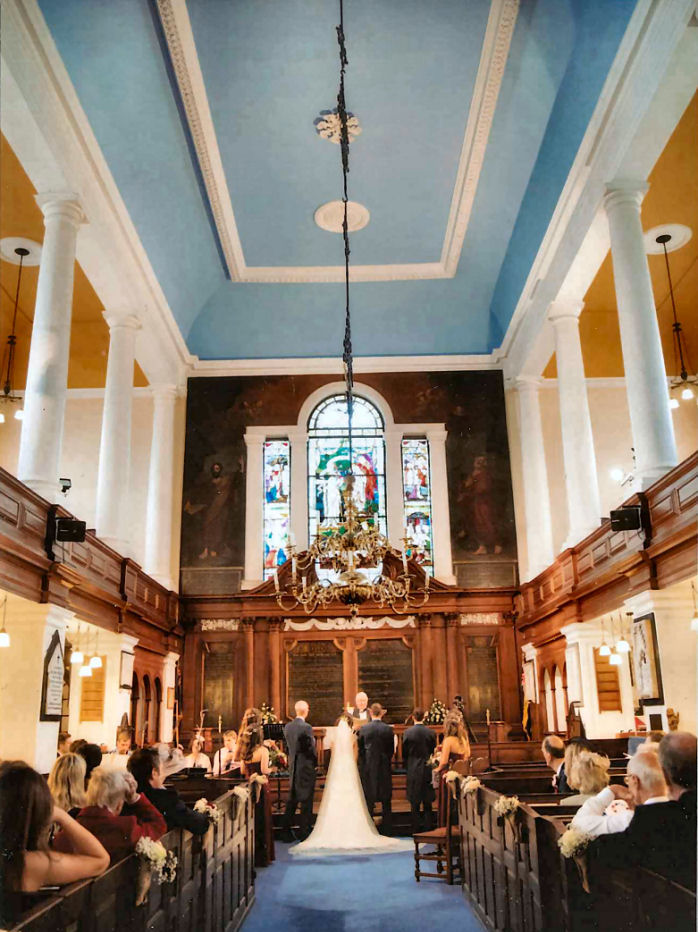
Christians believe that marriage is a gift from God. Roman Catholic and Orthodox churches particularly view it as a sacrament. Marriage is something holy, set apart - special. Christians see it as a lifelong commitment, and the best place in which to share in God's work of creation and bring up children.
As a church, therefore, we are committed to promoting and supporting marriage. We do our best to make every wedding service special. But your wedding day is just the start of the life-long adventure of marriage. So we are also committed to helping you reflect on the importance of your marriage vows and what they mean. We explore the spiritual dimension of marriage and see where God fits in.
For Christians, marriage also symbolises the divine union between Christ, the Bridegroom, and His Church, the Bride. God showed His love for us through Jesus giving his life for us. The apostle Paul, writing in the New Testament letter to the Ephesians, expected husbands to love their wives with that kind of sacrificial love. (That is often overlooked by those complaining about the instruction to wives to submit to their husbands!) Each spouse in a marriage gives up some individual rights over his or her life in exchange for rights over the life of the other spouse. Each gives him- or herself to the other in what is intended to be a lifelong union.
This is how Paul describes love in 1 Corinthians 13:4-7 (NIV):
Love is patient, love is kind. It does not envy, it does not boast, it is not proud. It is not rude, it is not self-seeking, it is not easily angered, it keeps no record of wrongs. Love does not delight in evil but rejoices in the truth. It always protects, always trusts, always hopes, always perseveres. Love never fails.
See here for more info.
Where can we marry?
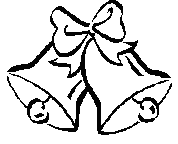
For weddings in the Church of England, normally you would marry in the parish at least one of you lives in, traditionally the bride. If you live in the Parish of Congleton, you may choose to marry in any of our four churches. You can check in which parish you live here (opens in new window). If you live between West Street and West Heath, you are probably in St James' parish.
In 2008, the Church broadened the choice, allowing you to choose a church which has special significance for you. This is subject to you fulfilling at least one of the following 'Qualifying Connections', i.e. if you can show:
that one of you:
• has at any time lived in the parish for a period of at least 6 months, or
• was baptised or confirmed in the parish concerned, or
• has at any time regularly gone to normal church services in the parish church for a period of at least 6 months;
or that one of your parents, at any time after you were born:
• has lived in the parish for a period of at least 6 months, or
• has regularly gone to normal church services in the parish church for a period of at least 6 months;
or that one of your parents or grandparents:
• was married in the parish.
You can read more about qualifying connections here (opens in new window).
What are Banns?
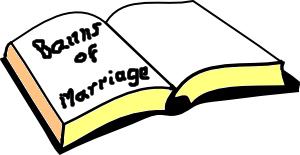
Banns of Marriage are in effect a notice read out in church. They are read three Sundays in a row at church services and give people the chance to say if they know any lawful reason why the couple in question may not marry - a question put to the congregation and indeed to the couple themselves at the beginning of their wedding ceremony. There is always a sigh of relief when that moment passes! (Remember the scene in the TV series 'Dallas' back in the early 80's?)
If you are getting married in an Anglican church, your banns are required to be read both there and in your local parish church, if you live somewhere else. So in terms of the Parish of Congleton,
• if you are marrying in one of our churches and both live here, your banns will be read in the church here;
• if you are marrying here but one or both of you live elsewhere, your banns will have to be read in your local parish church too;
• if you live here but are getting married in an Anglican church elsewhere, your banns will have to be read in one of our churches too.
The fee for reading banns separately, including the sending of a banns certificate that you will need to give to the vicar who is marrying you, is currently £. (Fees may undergo a slight rise at the beginning of each year.)
Note: we currently read all banns of marriage at St Stephen's Church, at both the 09:30 "One Service" and the 11:00 "more traditional" service.
Other Frequently Asked Questions:
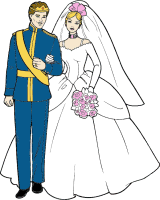
• I'm not baptised and don't go to church. Can we still get married in church?
Yes! The parish priest will want to get to know you a bit, talk about marriage and preparing for it.
• What if one of us is divorced?
The Church teaches that marriage is for life, but recognises that, sadly, some marriages fail. If this happens,
the Church remains open to all those involved. Before setting a wedding date in these circumstances,
arrange a meeting with your parish priest to have a frank and open discussion about the past,
about your hopes for the future and your current understanding of marriage. Read more
here.
• How much will it cost?
Fees for a wedding in church have been in part standardised by the Church of England, with churches' own costs added.
The usual fees across the Parish churches amount to £.
This is split between the statutory C-of-E fees that cover the vicar's fee, the administrative and legal side of calling the banns, etc.;
and local fees that cover organist's fees and heating where necessary. The only extras would be for a choir (St Stephen's only)
and for bells (St Peter's only), subject to availability.
For answers to other frequently asked questions, visit the Church of England wedding website here (opens in a new window).
Arranging a Marriage
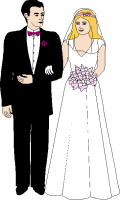
To arrange a wedding in one of the Parish of Congleton churches, please contact the Parish Office. Having ascertained that you live in the parish or have a qualifying connection, you will be asked basic details initially. We are obliged to check ID and address details, so you will need to come to the office with e.g. passports and utility bills (see here). Once checked, we will write to you to confirm the date.
In the case where you live outside the parish and no qualifying connections apply, you will be put in touch with the minister. Normally, you would have to attend the church at least once a month for six months to be eligible to go on that church's electoral roll. It may be possible to arrange a special or "Bishop's" licence. There is more information on these here.
If one of you is a foreign national without [Pre-] Settled Status under the EU Settlement Scheme, a Superintendent Registrar's Marriage Schedule will likely be required and you would marry by licence, not banns. (See here.)
A few months before your wedding, we will write to you requesting that you contact the minister to arrange a meeting to discuss your wedding and go through the service with you. This letter will also include suggestions about music, and the contact details of the organist who will play on the day. Shortly before your wedding day, the minister will invite you to a wedding rehearsal at the church.